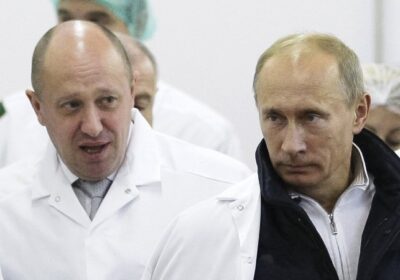The shocking and utterly unsurprising end of Yevgeny Prigozhin

Save articles for later
Add articles to your saved list and come back to them any time.
London: Perhaps the only thing we should be surprised about is that it took this long.
The assumed demise of Yevgeny Prigozhin, the mercenary leader who mounted the greatest challenge to Vladimir Putin’s authority in two decades during a short-lived mutiny in Russia in June, was shocking but no shock.
Yevgeny Prigozhin in a military vehicle in a street in Rostov-on-Don, Russia, in June.Credit: AP
Loyalists might view it as a kind of poetic justice, but is another reminder of revenge served Putin-style, and of the thuggish mafia state he runs. We should not shed a tear for Prigozhin and we should never forget how Putin treats those who pose a threat to him. Poisonings, detainment, torture, disappearances, falls from windows, and now, likely, a plane shot from the sky.
Putin – an ex-KGB officer – has maintained that the one thing he can’t forgive is betrayal.
Videos shared on social media channels known to be close to the Russian security services showed graphic images of a crash site in the Tver region north-west of Moscow, near the village of Kuzhenkino.
The footage appeared to show emergency services approaching the burning wreckage of a plane. Eight bodies have been recovered from the site, authorities said. Few will buy that this was really an accident.
Yevgeny Prigozhin, top, serves food to then-Russian Prime Minister Vladimir Putin at Prigozhin’s restaurant outside Moscow in 2011.Credit: AP
Ever since Prigozhin marched an army of disgruntled mercenaries on Moscow, Kremlin watchers had been wondering why on earth Putin had allowed his former caterer to remain alive, let alone a free man.
In the beginning, the Wagner founder was for many years the man Putin could rely on, providing everything from mass catering solutions to a troll farm for influencing the 2016 US elections, and an off-the-book mercenary outfit for deniable wars in Ukraine, Syria and Libya.
But as mercenaries charged toward the Russian capital two months ago, downing Russian aircraft and reportedly killing 13 servicemen on the way, Putin was thought to have flown to St Petersburg.
Whether it was true does not matter; the perception became a reality as it took hold of Russian social media channels.
The strongman was scared and on the run.
No longer in control of the reins of power.
Prigozhin, in the end, was a coward who couldn’t go through with his threats.
He talked himself out of a challenge, but it turns out a deal to go into exile in Belarus was too good to be true.
Daniel Hoffman, a former senior CIA operations officer who served as the agency’s Moscow station chief, said on Wednesday night he had no doubts the plane fell from the sky on Putin’s orders.
He said he believed that Prigozhin was not arrested after his failed mutiny “to give him a kind of false sense of security, freedom of movement, so they could snipe him”.
“This is about regime security for Vladimir Putin. You cannot allow a guy you called a traitor in late June, when he launched a mutiny, to live. That’s just not going to happen. And Prigozhin, whose formative experience was as a hot dog salesman, probably had an inflated opinion of his staying power.”
Prigozhin’s death will have a negligible effect on the front lines in Ukraine but its impact on African countries, where Wagner was and remained active, is more uncertain.
He had reportedly been in Africa on Monday, attempting to prevent the GRU, Russia’s military intelligence agency, from pushing his forces out of the continent.
Potentially the biggest ripples will be inside Russia.
If he was killed on Putin’s orders, it reinforces Putin’s image as a strongman full of vengeance, who is willing to dispense with procedure and law.
These methods have also undermined the notion that Russia is a regular state, exposing Putin’s regime as a mafia-like enterprise driven by personal whim and blood feuds.
It must be remembered that the very existence of Wagner, a private army that is formally banned by Russian criminal code, was a sign of Putin’s mistrust in regular institutions of the state and his reliance on informal connections.
As the drama unfolded, Putin was at a gathering in Kursk, about 500km south of Moscow, hailing the victory of Soviet troops over German invaders 80 years ago.
“I heartily congratulate all citizens of Russia on this event,” Putin told the crowd while standing onstage in front of an orchestra, in footage that made its way across social media.
He also thanked Russian fighters involved in the country’s war on Ukraine, which Putin still refers to as a “special military operation”.
The crash came on a day of wider retribution.
General Sergei Surovikin was relieved as commander of Russia’s air and space forces. Surovikin was closely associated with Prigozhin and was suspected of aiding the mutiny or having foreknowledge of it.
Two months later, the culprits have been executed.
Sir Richard Dearlove, a former head of MI6, told the UK’s Telegraph that news of Wagner leader Prigozhin’s death was “unsurprising”.
‘We used to have a saying when I worked on the Soviet Union … that nothing happened by accident.’
“We used to have a saying when I worked on the Soviet Union, which was that the wise line to take on Soviet Russia was that nothing happened by accident, and one might apply that to this event.”
After all, when did we expect the truth out of Russia anyway?
Get a note directly from our foreign correspondents on what’s making headlines around the world. Sign up for the weekly What in the World newsletter here.
Most Viewed in World
From our partners
Source: Read Full Article

